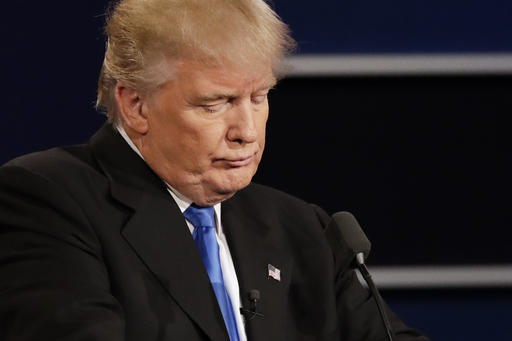AUSTIN, Texas (AP) — In his latest attempt to cast doubt on the election process, GOP presidential candidate Donald Trump raised suspicions Thursday about the voting machines in reliably Republican Texas despite producing no evidence of an actual problem.
“A lot of call-ins about vote flipping at the voting booths in Texas. People are not happy. BIG lines. What is going on?” Trump said in a message to his followers on Twitter.
An email sent to his campaign to determine where the candidate got his information was not immediately returned.
Texas Secretary of State Carlos Cascos, a Republican, said on Facebook that there was no evidence of vote-flipping, a term generally used to describe a correctable technical glitch on older electronic voting machines. Cascos’ spokeswoman said he was responding to speculation circulating on social media.
“Our office has received reports concerning rumors that some voting machines may be changing candidate selections when voters cast straight party ballots,” Cascos said in his statement, which was posted a day before Trump sent his Twitter message. “We are actively monitoring the situation, and have yet to receive any verified reports of machines changing votes.”
Cascos’ spokeswoman added that the reports the office has received have not come from voters who personally experienced a problem. Local election officials have said the machines are not malfunctioning and some voters may be inadvertently making errors.
“The machines work exactly as intended. There was no vote-flipping,” said Shannon Lackey, the elections administrator of Randall County, in the Texas Panhandle.
Vote-flipping generally describes a circumstance in which a voter claims an electronic voting machine — usually of the touchscreen variety — changed the selection from one candidate to another. Election officials say those claims usually are traced to user error.
When they do occur, it is typically during a process called straight-ticket voting that is used to select all candidates from one party. Voters might press the button next to a candidate a second time to affirm their choice, but instead wind up de-selecting the candidate.
If voters notice a wrong selection, they can correct it before submitting their ballot.
The case cited in Randall County involved straight voting on a machine made by Hart InterCivic that uses a wheel to make selections. In many instances, calibration errors on touchscreen machines — the Diebold AccuVote is the most famous for this — have led to flipping. The machines simply need to be recalibrated.
In Georgia, a voter this week reported trying to cast an early ballot for Clinton but said Trump’s name kept showing up instead. A spokesman for Secretary of State Brian Kemp said it appeared the county improperly tested the machine but said its office was confident machines were not flipping votes.
Trump has claimed over the final weeks of the presidential campaign that the election is rigged against him and suggested the possibility of widespread voter fraud. The billionaire has provided no evidence supporting those claims.
In the meantime, voting rights groups in Texas said there is actual evidence of misinformation at some polling places over a newly weakened voter ID law.
Voters who do not have one of seven previously required forms of photo ID can cast a ballot this year by signing an affidavit, but some polling locations put up outdated signs listing the old rules.
A hotline set up by voting rights watchdogs has received about 300 calls since early voting started in Texas on Monday, said Zenen Jaimes Perez, a spokesman for the Texas Civil Rights Project. He said some callers said they were mistakenly turned away because they didn’t have a photo ID.
Perez said the problems do not seem to be an overt attempt to suppress the vote.
“I don’t think we’ve seen a trend of intentionally trying to get people out” of line, he said.
The stricter ID law was passed in 2011 by the Republican-led state Legislature and was found by a federal appeals court this summer to disproportionately affect minorities and poorer people, who tend to vote Democratic. Texas had enforced the full law in previous elections but was under court order to let voters without a photo ID cast a ballot this time.
Trump’s suggestion of problems in Texas is all the more unusual because the state is so reliably Republican. While polls show a tighter than normal presidential race, Texas has not voted for a Democratic presidential candidate since Jimmy Carter in 1976 and Hillary Clinton is not campaigning there.
Copyright 2024 The Associated Press. All rights reserved. This material may not be published, broadcast, rewritten or redistributed.

